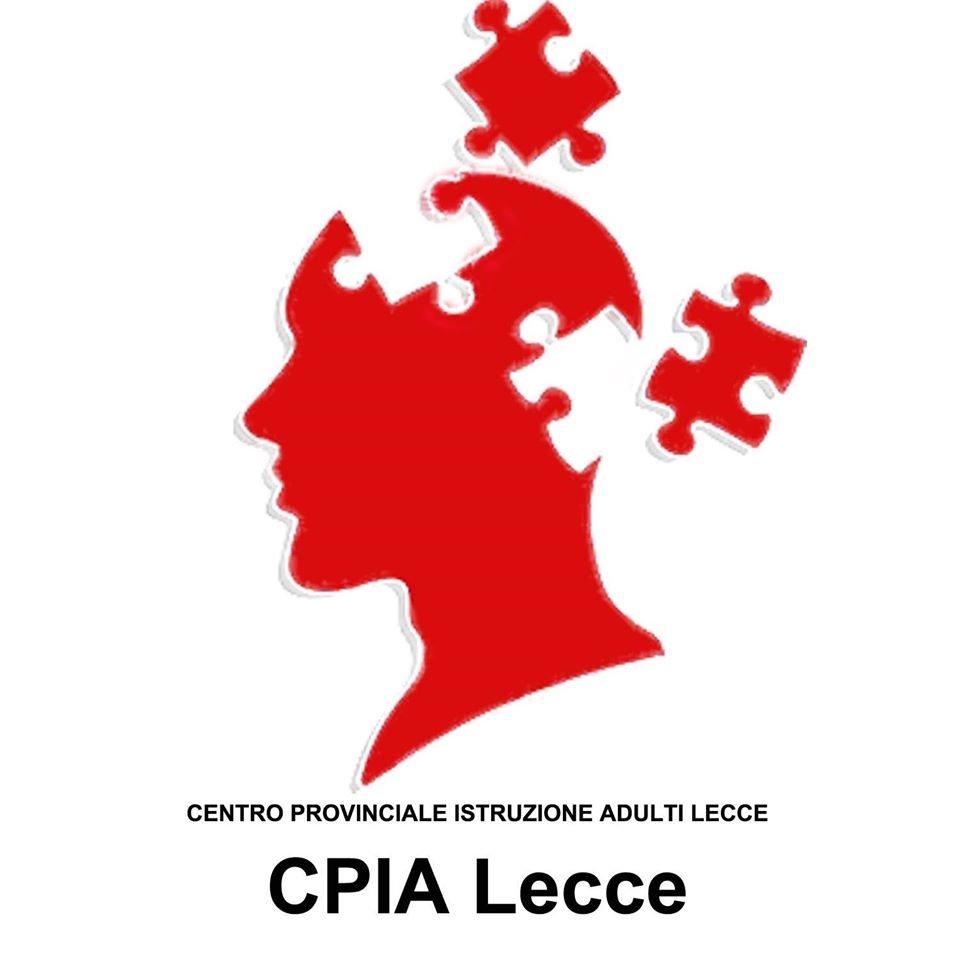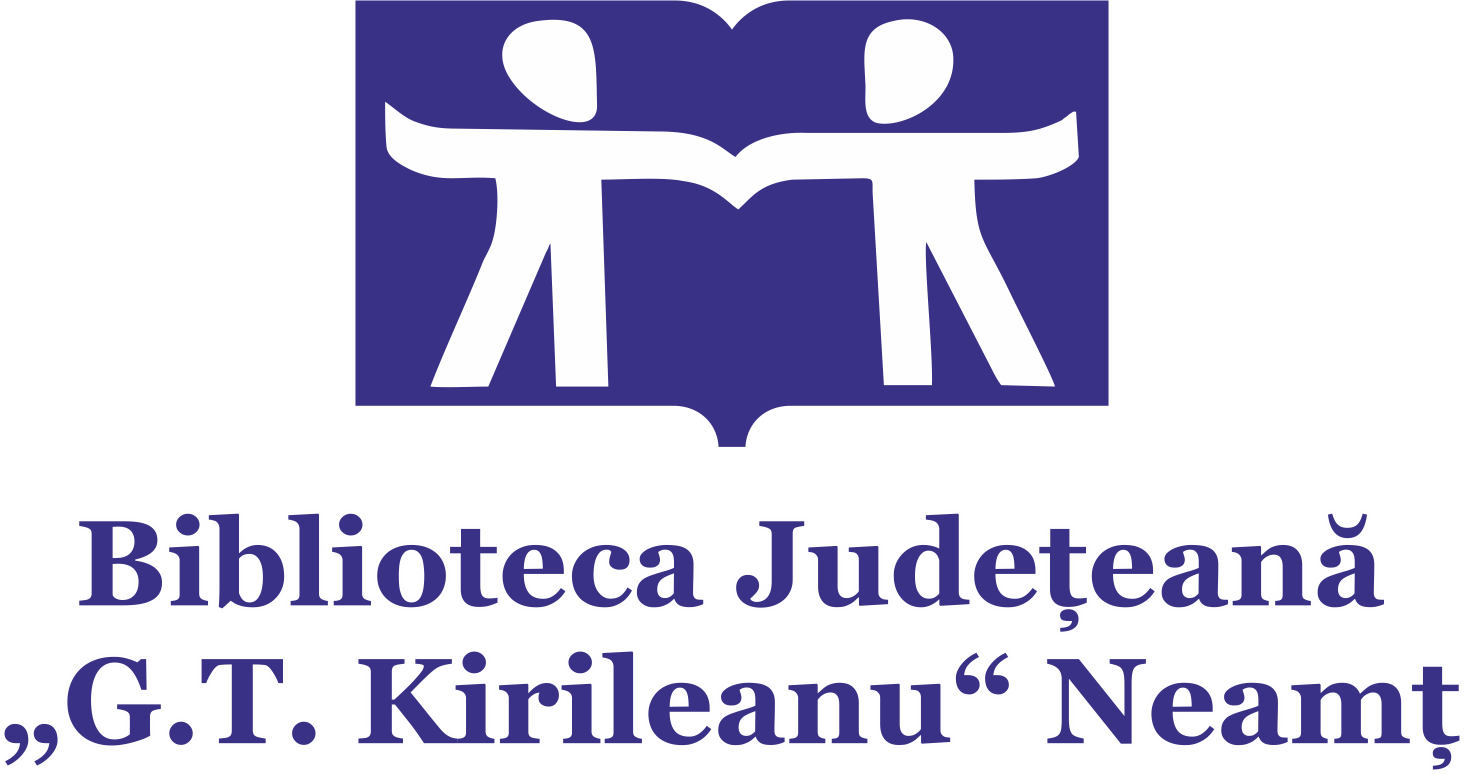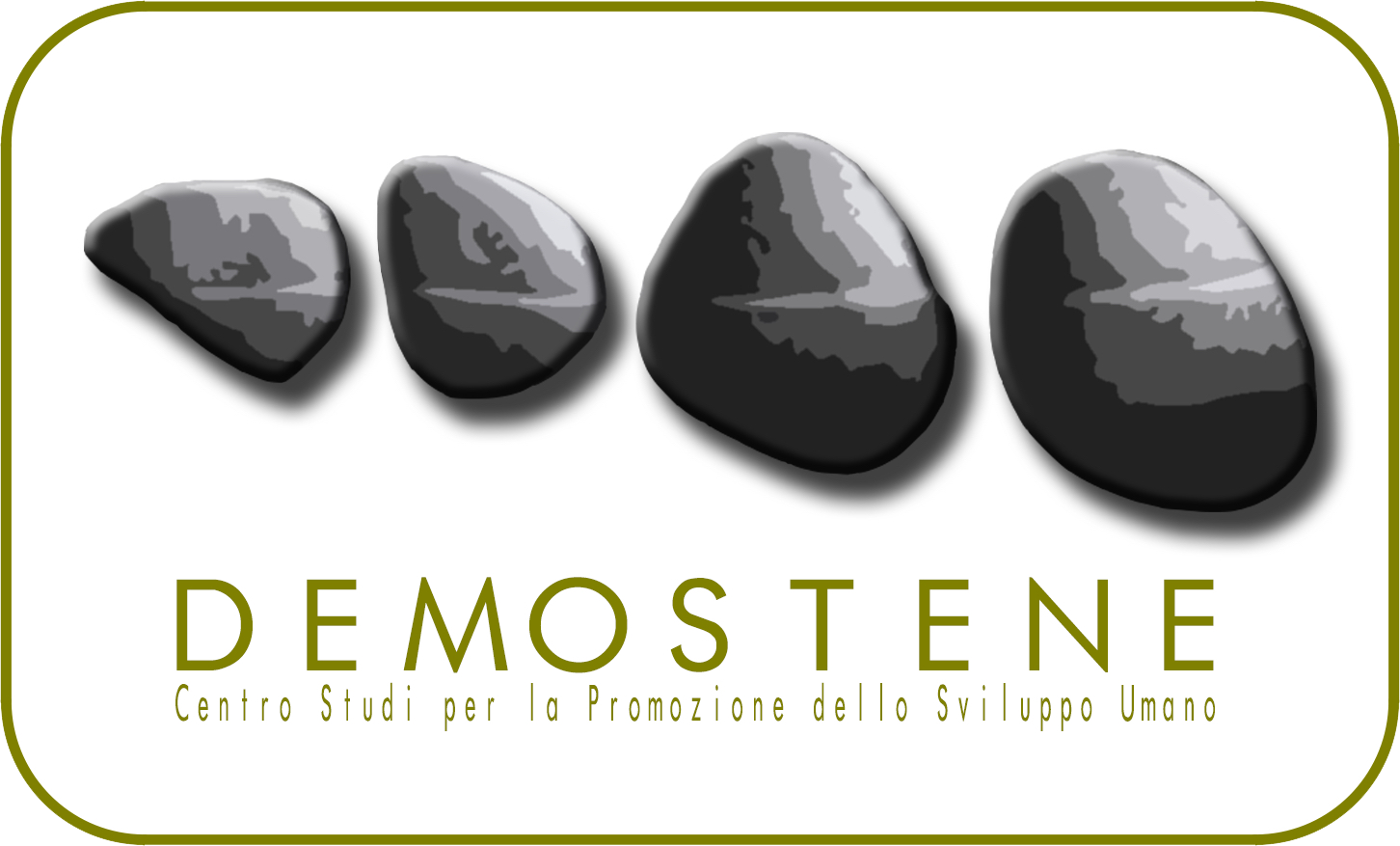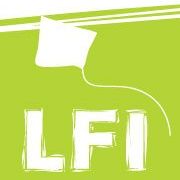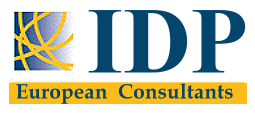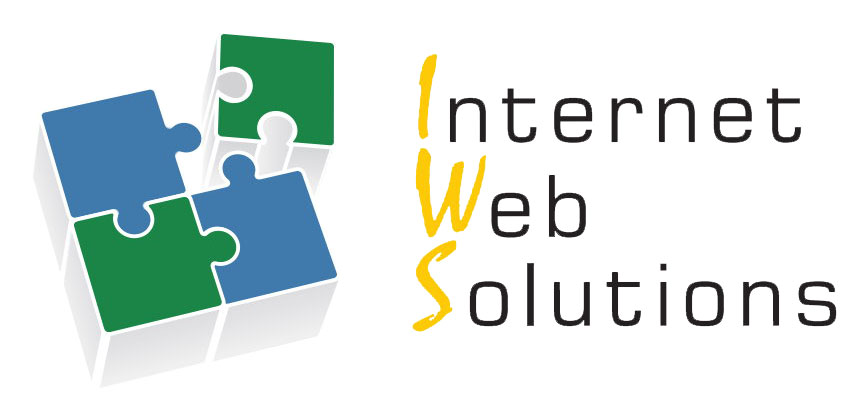News
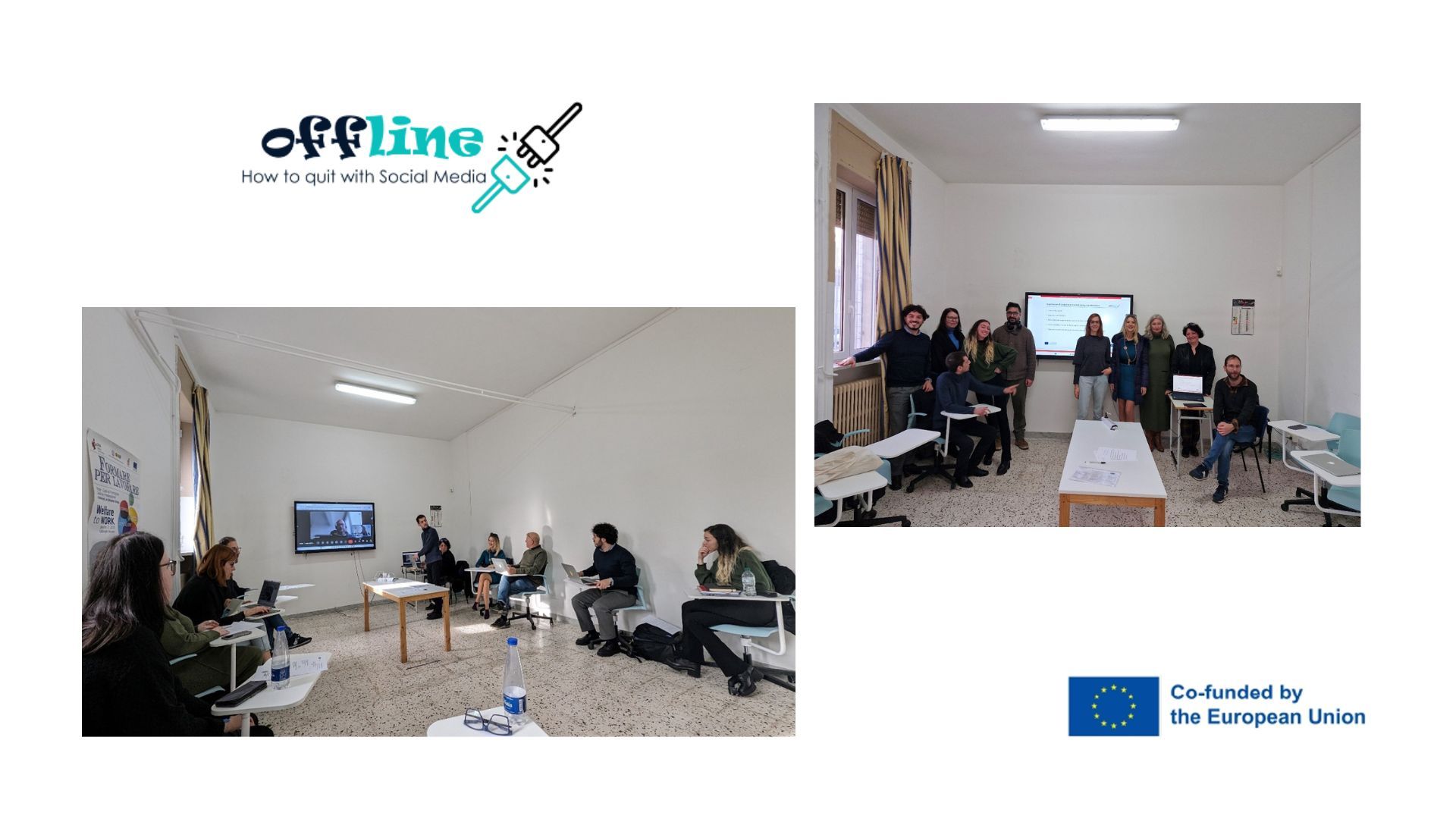
OFF LINE How to quit with Social Media.
Closing meeting in Lecce
07/02/2024After two years of implementation, the OFFLINE How to quit with Social Media Erasmus+ project came to an official conclusion. Partners gathered together on 19 January, 2024 in Lecce (IT) to celebrate the successful completion of the project and discuss together the impact and results achieved throughout these 24 months of work. The meeting was hosted by CPIA Lecce and saw the participation of seven other project partners from five different EU countries (Belgium, Finland, Italy, Romania and Spain). After a brief welcome and introduction by the staff of CPIA, partners focused on the content of the agenda, including: Summary and recap of lessons learnt, consolidated good practices and takeaways for further exploitation of results Content of the OFFLINE Vademecum, last formal project result finalised by partners before the official ending of the project The Vademecum for Slow Navigation provides for an in-depth guide into mindful digital practices and offers a roadmap for recalibrating individuals’ interactions within the digital sphere. This comprehensive guide is divided into different sections, each addressing different aspects of mindful online engagement, with the aim of mitigating the negative effects of excessive screen time and promoting a more balanced and mindful digital lifestyle. The Vademecum is available in online, multilanguage and open access format and users can access and download the content for free on the project website. The sections of the Vademecum are: Understanding slow navigation: slow navigation is a digital and social media approach that helps individuals to discover how to consume and engage social and digital media in a way that it feels more authentic. It allows people to reconnect with what matters and who matters. Mindful social media usage: it is no secret that social media has drastically changed our societies. From the way businesses are conducted, to how we interact and socialise, social media defined a new paradigm of “para-relations” that blurred the margins of reality as we know it. Practicing digital detox: digital detoxification involves eliminating excess exposure to digital media as a means of information and, more importantly, leisure. In other words, it is about taking a break from the digital overload we face every day, allowing more time for ourselves, away from screens. The dangers of social media addiction: today people post pictures, messages, comments, tweets and retweets and spend hours interacting in social media rather than in person. With the widespread use of social networking sites, social media addiction has become a more prominent problem especially among young people, but also in different age groups. Setting intentions for social media usages: social media is designed to grab your attention and keep you in the application for as long as possible. To do this, they exploit the lack of specific intentionality in our use of social media: in fact, we often just want to fill some time between one thing and another. But the lack of intentionality in our use of social media makes us easy prey to useless, if not harmful, content for our balance and mood. Balancing Offline and Online life: today's world requires the use of many digital devices, and the online environment is often necessary in people's lives. We need to know how to use technology to improve our communities and lives (both physical/offline and digital/online). Just as a balanced diet contributes to a state of physical health, so too a balance needs to be created between the physical and digital worlds, between physical/offline and digital/online activities, as moderation and balance ensure productivity and health. Time Management techniques for online activities: although it is most certainly true that the internet changed for the better the way and ease in which people can work, process information and acquire new knowledge, high exposure to screen time comes with several downside and negative effects on individuals. The most effective countermeasure that we have against the negative effects of extended screen time is proper and sound consideration of the quantity and quality of time that we decide to spend in front of digital devices. Navigating information overload: the advent of the World Wide Web eased exponentially the way in which we gather, collect and process information. Knowledge has never been more accessible then now, and with all the opportunities and resources available, whatever will ever be needed is just a few clicks away. However, this abundance of information generates the challenge of dealing with “too much information”: an overloading of resources and data that makes particularly difficult the process of selecting and consuming the exact information that we need. Embracing offline activities: embracing offline activities is crucial for our mental, emotional, and physical well- being. In this section, we will highlight the importance of cultivating offline hobbies, engaging in face-to-face social interactions, and prioritising self-care. We will also provide a list of suggested offline activities to help you lead a more balanced and fulfilling life. Assessing your current habits: Self-assessing your responsible use of social media and the internet is an important step in maintaining a healthy digital presence. In this section, we discuss the steps for evaluating your own online behaviour and how to set clear goals for online usage. We also provide a questionnaire for evaluating your online habits. The Vademecum for Slow Navigation follow a long series of results that partners developed during implementation. Results of OFFLINE are designed and tailored to support and “teach” people on how to: reduce the time spent on social media by promoting a more fruitful use of media; develop among adults an aptitude and a culture of correct information through for example digital newspapers or magazines or other accredited sources. The Vademecum and all other project results are available from the official eLearning platform of the project: www.offlineproject.eu
Read More
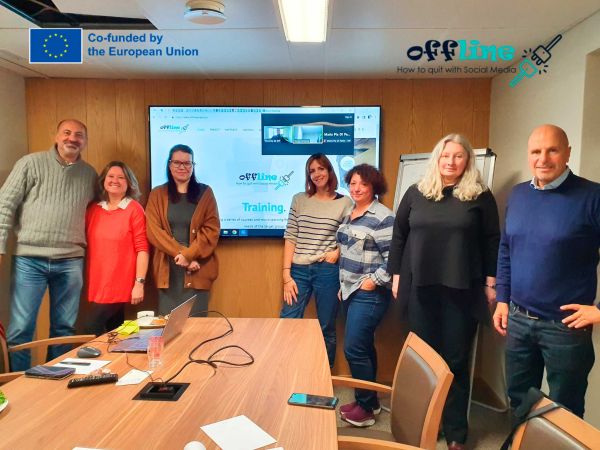
The transnational meeting in Helsinki and the development of the Vademecum for Slow Navigation
Partner organisations met in Helsinki to update each other on the progress of the project and prepare to launch the new Vademecum for Slow Navigation!
31/10/2023On 23 October, the third transnational partner meeting of the 'Offline - How to quit with social media' project was held in Helsinki. The meeting this time was hosted by the Finnish organisation 'Learning for integration' and coordinated by Marja-Lisa Helenius. The respective project leaders were able to directly discuss the progress of the project and especially the latest project result, namely the Vademecum for Slow Navigation. The Vademecum for Slow Navigation is intended to be a manual for gradual detoxification from social media with the aim of helping people to limit and reduce the time spent on social media. In fact, over the past few weeks, after working out the general structure and agreeing on the different thematic sections of this last intellectual product, all partners have been working on the development of the section assigned to them. The meeting was therefore crucial to review all the contributions and start systematising them in order to arrive at the final version that is expected to be ready by the end of November and uploaded on the OER platform by december 2023. But the meeting was not all business! The partners were able to exchange views and new ideas for future collaborations, as well as enjoy pleasant breaks and a few walks around Helsinki's attractions! See you soon with the latest project news, in the meantime discover the courses of the Offline project available in the Training section of the platform! For more information visit: https://www.offlineproject.eu/
Read More
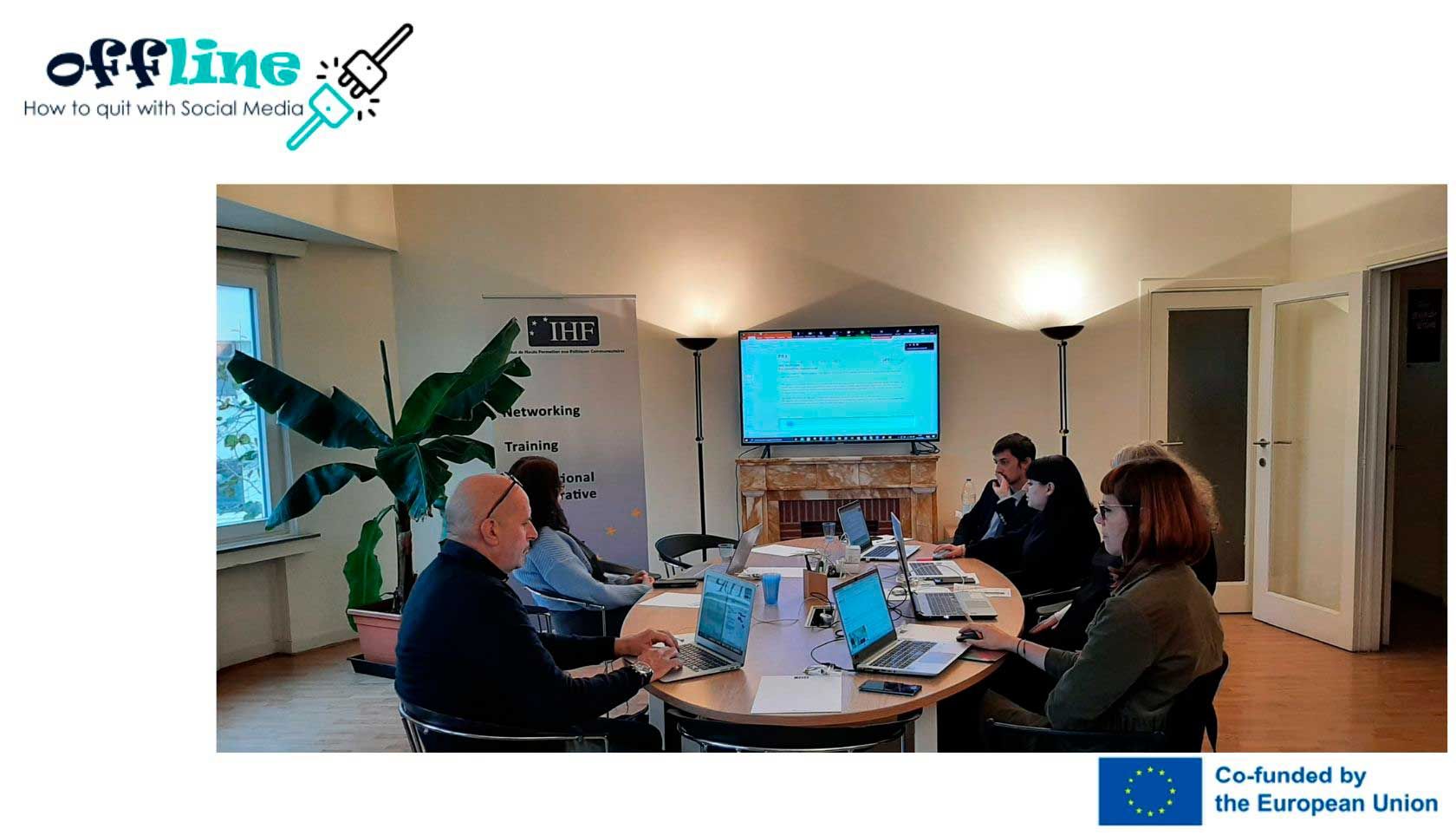
OFF-LINE – How to quit with social media
A project discussion on evidences from the needs assessment and the way ahead
09/06/2023On Nov 18, 2022, OFF-LINE project partners gathered together in Brussels at IHF’s headquarters to take stock of project’s progresses so far, evidences and insights from the need’s assessment analysis and training areas of interest to sustain adults in having a better and healthier relation with digital technologies and the digital content available online.
The transnational project meeting has been scheduled at mid-project implementation and in conjunction with the achievement of a pivotal project’s milestone, which is represented by the consolidation of: Self-assessment tool to measure the target's attitude at surfing properly through cultural, informative, and scientific contents (available here: https://www.offlineproject.eu/sat.php?lang=EN), a digital repository of webzines, cultural sources and National Press Agencies as a go-to web point for searching and filtering information on science, culture, well-being, information and entertainment etc. (https://www.offlineproject.eu/repositories.php?lang=EN), and a selection of case studies of initiatives to promote digital literacy, fake news’ prevention, digital culture and a positive attitude towards digital media literacy (https://www.offlineproject.eu/case_studies.php?lang=EN).
All of the above gave partners the opportunity to discuss during the meeting the training areas of interest that should be tackled by the OFF-LINE curriculum, including specific training topics and list of desired learning outcomes.
In total, 10 training courses stemmed from the analysis:
Digital content creation: a practical guide
Entertainment and culture in the digital age
Protecting the environment
Preventing and recognizing fake news
Creatively using digital technologies
Media Literacy
Protecting health and well-being of digital environments and cyberbullying
Browsing, searching and filtering information & digital content
Engaging citizenship through digital technologies
Evaluating data, information and digital content
In a later stage of project’s implementation, the curriculum will be delivered transnationally to a cohort of targets’ representatives and stakeholders of interest (i.e., both direct beneficiaries of the training content as well as other professionals/educators operating in the fields of Adult education, digital and media literacy, etc.). An internal and common project plan for the roll-out in pilot version of the training content has been discussed and agreed on by partners during the same event
The whole package of training content is available in open access format & in multilanguage version in the dedicated section of project’s e-learning platform: https://www.offlineproject.eu/training.php?lang=EN
Partners will meet together once again in early autumn 2023 in Helsinki to review and evaluate the progresses and results from the piloting, the final outline of vamedecum – last official project’s results, a brief manual conceived to help people in adopting an healthier use of web medias and resources – and ease the transition of the project through a smooth conclusion.
To know more about OFF-LINE and be part of the community of practice, please consult: www.offlineproject.eu
Read More
.jpg)
“OFF-LINE: How to quit with social media”
Digital Repository and Cultural resources on the OER platform
02/06/2023“OFF-Line: how to quit social media” is the project that will help you discover the digital world as a place that promotes culture, correct informations and the development of a constructive and critical thinking. Reducing the time spent on social media is the main objective of the project, and this can be done by adopting a more correct navigation, a correct information through quality and accredited digital resources. The Mapping section on the OER platform of the project, available at https://www.offlineproject.eu/mapping.php?lang=EN, provides a free thematic digital repository (of resources on culture and information), and a self-assessment tool to measure the aptitude of correct navigation among different types of content. When looking for information using digital resources, abilities and attitude towards digital skills, online cultural attitude and time spent on social media are important. Regarding these aspects, the SAT (self-assessment tool), available at https://www.offlineproject.eu/sat.php?lang=EN, provides a quiz on three levels, that will guide you to the next steps you have to take in order to improve your abilities and attitude on the three aspects and skills and develop competences necessary to use digital resources. The SAT will help you learn how to navigate correctly through cultural, informative, scientific and other types of contents. The digital repository, available at https://www.offlineproject.eu/repositories.php?lang=EN, contains mapping of free online cultural resources and creativity tools already available online in each partner country, providing short descriptions and access links to magazines and other information and cultural resources. The Offline Platform available in five languages is ment to becomes a focal point to stimulate critical thinking, intellectuality, research and in-depth study. OFF-LINE is a project managed by seven partners from five countries, Romania, Italy, Finland, Spain and Belgium, and is co-funded by the Erasmus+ Program of the European Commission. For more information on this project, please access https://www.offlineproject.eu/
Read More
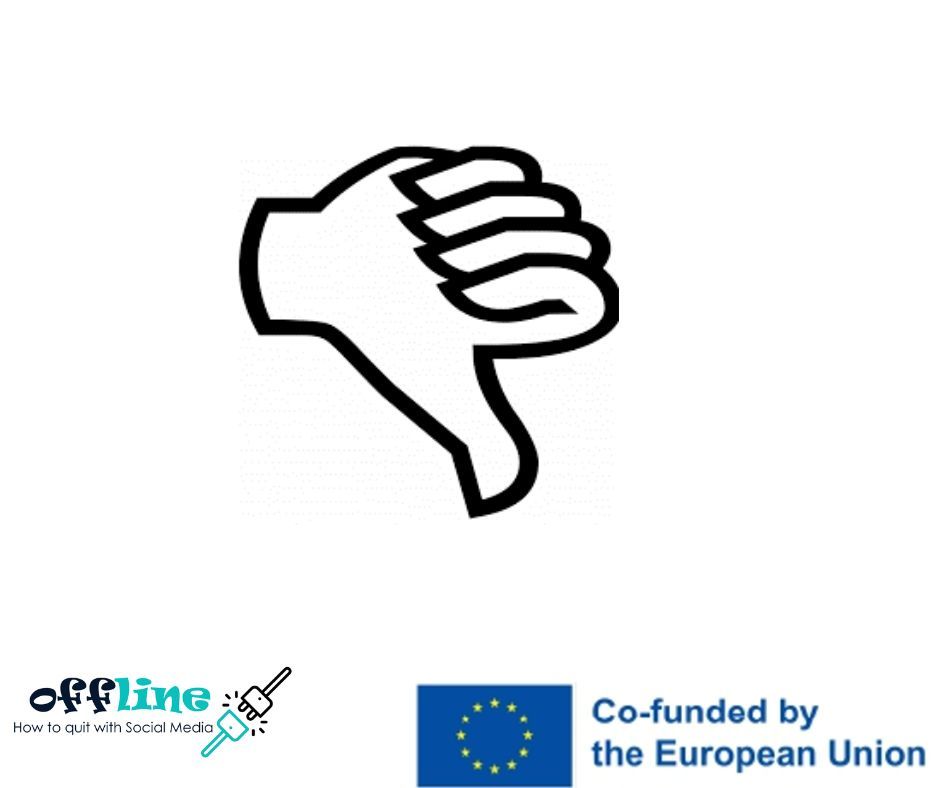
THE DECLINE OF SOCIAL NETWORKS
21/02/2023In this article, we would like to quote some salient parts of The Atlantic journalist Ian Bogost's article, which fully describe the spirit of our project. According to Ian Bogost, in his emblematic article entitled “The Age of Social Media Is Ending It never should have begun”, Social networks in the last twenty years have taken over. But instead of facilitating the modest use of existing connections—largely for offline life (to organize a birthday party, say) —social software turned those connections into a latent broadcast channel. All at once, billions of people saw themselves as celebrities, pundits, and tastemakers. (…) Actually, as the original name suggested, social networking involved connecting, not publishing LinkedIn promised to make job searching and business networking possible by traversing the connections of your connections. Friendster did so for personal relationships, Facebook for college mates, and so on. The whole idea of social networks was networking: building or deepening relationships, mostly with people you knew. That changed when social networking became social media. Instead of connection—forging latent ties to people and organizations we would mostly ignore—social media offered platforms through which people could publish content as widely as possible, well beyond their networks of immediate contacts. (…) The terms social network and social media are used interchangeably now, but they shouldn’t be. A social network is an idle, inactive system—a Rolodex of contacts, a notebook of sales targets, a yearbook of possible soul mates. But social media is active—hyperactive, really—spewing material across those networks instead of leaving them alone until needed. (…) The toxicity of social media makes it easy to forget how truly magical this innovation felt when it was new. From 2004 to 2009, you could join Facebook and everyone you’d ever known—including people you’d definitely lost track of—was right there, ready to connect or reconnect. The posts and photos I saw characterized my friends’ changing lives, not the conspiracy theories that their unhinged friends had shared with them (…) Social networks, once latent routes for possible contact, became superhighways of constant content (…) connection is no longer the central element. And the values associated with scale—reaching a lot of people easily and cheaply, and reaping the benefits—became appealing to everyone: a journalist earning reputational capital on Twitter; a 20-something seeking sponsorship on Instagram; a dissident spreading word of their cause on YouTube; an insurrectionist sowing rebellion on Facebook; an autopornographer selling sex, or its image, on OnlyFans; a self-styled guru hawking advice on LinkedIn. Social media showed that everyone has the potential to reach a massive audience at low cost and high gain—and that potential gave many people the impression that they deserve such an audience. The flip side of that coin also shines. On social media, everyone believes that anyone to whom they have access owes them an audience people just aren’t meant to talk to one another this much. They shouldn’t have that much to say, they shouldn’t expect to receive such a large audience for that expression, and they shouldn’t suppose a right to comment or rejoinder for every thought or notion either. From being asked to review every product you buy to believing that every tweet or Instagram image warrants likes or comments or follows, social media produced a positively unhinged, sociopathic rendition of human sociality. (…) Something may yet survive the fire that would burn it down: social networks, the services’ overlooked, molten core. It was never a terrible idea, at least, to use computers to connect to one another on occasion, for justified reasons, and in moderation (although the risk of instrumentalizing one another was present from the outset). The problem came from doing so all the time, as a lifestyle, an aspiration, an obsession. (…) We cannot make social media good, because it is fundamentally bad, deep in its very structure. All we can do is hope that it withers away, and play our small part in helping abandon it. Read the full article HERE https://www.theatlantic.com/technology/archive/2022/11/twitter-facebook-social-media-decline/672074/
Read More
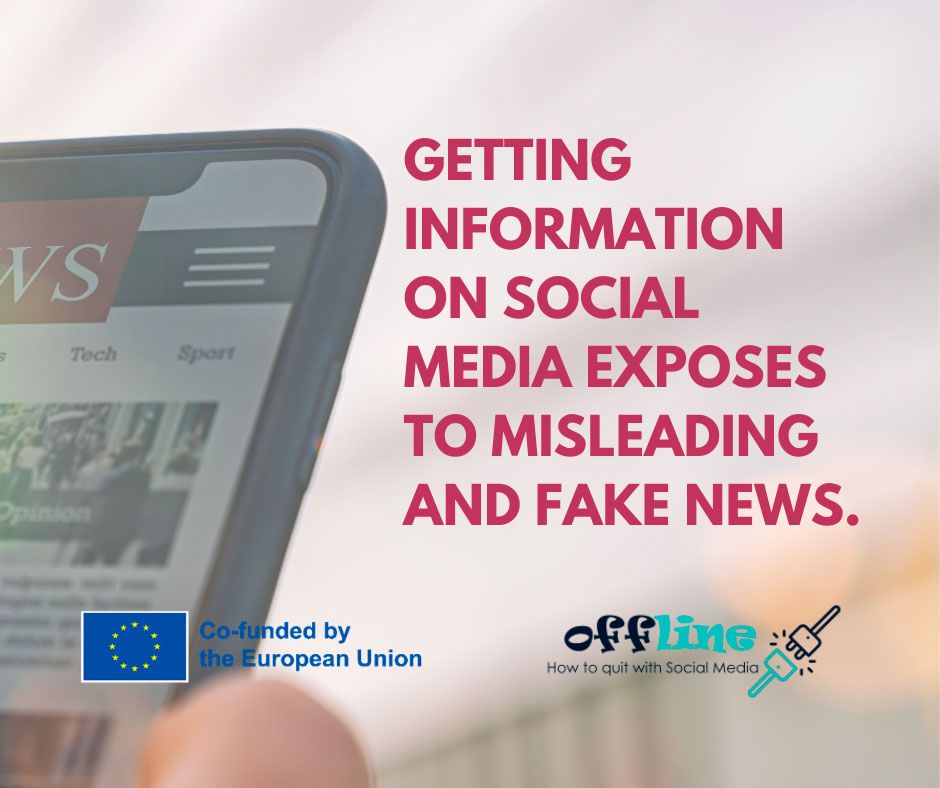
"How to quit with social media”: the new section of the OFFLINE platform that helps you find reliable sources of information and quality cultural resources.
29/11/2022TV news is still the main source of information for most European citizens, however social media, and in particular Facebook, are increasingly used as points of access to news.
The fact that millions of citizens inform themselves on social media is not exactly a reassuring fact, considering the lack of transparency in the way in which news is distributed on social media and the reliability of the sources of information.
The risk of getting information on social media is that one may not obtain an objective and complete vision of the events and of being exposed to misleading news because they’re not well contextualized or even to fake news, that is completely groundless news.
As a result, public opinion is increasingly polarized on opposing positions that are irreconcilable with the effect of making our societies more fragmented and our democracies more fragile.
For this reason, the platform of the “OFFLINE” project, in addition to courses to improve the ability to inform oneself critically through online sources outside of social media, provides a special section that collects reliable and accredited online sources of information and many quality cultural resources in the languages of the project. Browse it now from here!
Read More
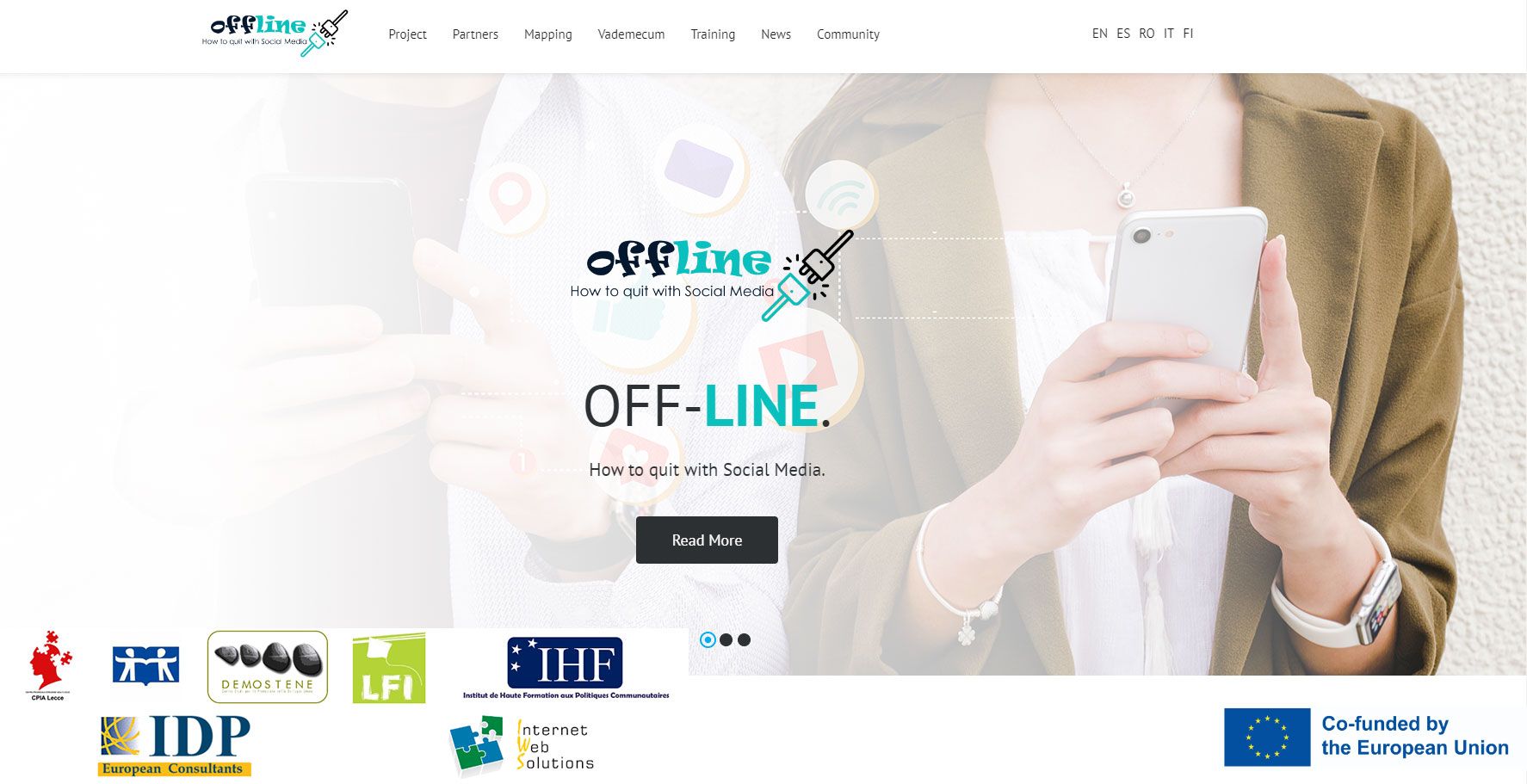
How to quit with Social Media: the OFFLINE Platform is available online in five languages.
18/07/2022The OFFLINE OER platform is now online in five languages at https://www.offlineproject.eu/, providing specific info on project aims, activities and results. The Platform will contain all the Project information, deliverables and results. OFFLINE's General Objective is to contribute to making the world wide web and social channels a place that promotes culture, correct information and critical, constructive and dialoguing thinking. Offline aims at: Reducing the time spent on social media by promoting a more correct navigation. Developing among adults an aptitude and a culture of correct information through, for example, digital newspapers or magazines or other accredited sources. Offline is designed to work towards SMART OUTCOMES: Increase digital culture among adults. Guide adults towards correct navigation, in particular towards more cultural content. Develop an attitude and a culture of correct information among adults through, for example, newspapers or digital magazines or other accredited sources. Develop basic and transversal skills among adults, such as digital skills and multilingualism. Decrease connection time in social media. The accessible and user-friendly Platform has been built by the Spanish partner, IWS (Internet Web Solutions) and will be constantly updated by the partnership as a whole during the project implementation. OFFLINE OER Platform is available in five languages (English, Spanish, Romanian, Italian and Finnish) and is composed of the following sections freely available to all navigators. PROJECT: describes the main Project objectives and results. PARTNERS: describes the Partners involved in the OFFLINE Project. MAPPING: summarised the mapping of free cultural resources and creativity tools already available online in each partner country. VADEMECUM: It will be a user-friendly and "attractive" guide containing a handbook of notions and tips for getting out of social media. TRAINING: series of courses and micro-learning fiches developed taking into account the target group's specific needs. NEWS: to remain always updated with OFFLINE latest developments COMMUNITY: to involve as many Associated Partners as possible and spread the word about OFF-LINE is managed by seven partners from five countries, i.e. Romania, Italy, Finland, Spain and Belgium, and is co-financed by the Erasmus+ Programme of the European Commission.
Read More
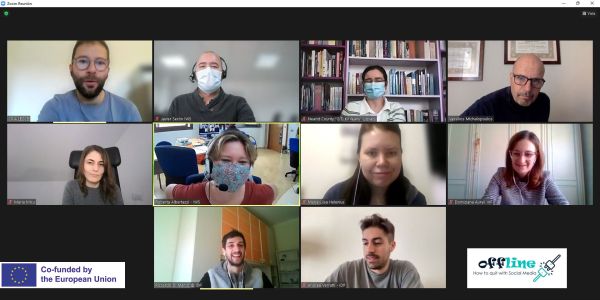
OFF-LINE: How to quit with social media”: The consortium joined the online Kick-Off Meeting of the OFF-LINE project
20/05/2022On April 20th, 2022, the consortium joined the Kick-Off Meeting of the OFF-LINE project, which is co-funded by the Erasmus Plus Program of the European Commission and brings together 7 Partners from 5 countries (Italy, Belgium, Spain, Finland and Romania). The KOM was held in online mode. Whilst nearly 60% of the world’s population is already online, the latest trends suggest that more than half of the world’s total population will use social media by mid-2022 (Hootsuite, 2020). However, this should not be acclaimed as a success, if we consider social media’s hidden pitfalls and dangers, such as data privacy violations and fake news. It is, indeed, no coincidence that the world’s average IQ started lowering since 2009. In order to contrast this not-so-pleasant scenario, the “OFF-Line: how to quit social media” project aims at contributing to transform the digital world in a place that promotes culture, correct informations and the development of a constructive and critical thinking. The specific objectives will therefore be reducing the time spent on social media by promoting a more correct and virtuous navigation, and develop a culture of correct information among adults, through digital newspapers or magazines or other accredited source. During the meeting, the consortium discussed about the overall project implementation schedule, defining timelines and respective duties. During the first phase, partners will carry out primary research of media and online resources aimed at fostering interest in cultural and online media activities that promote the development of critical thinking. The results will help partners develop tailored training courses and tools to be uploaded on the OFF-LINE OER platform, along with other project’s outputs, news and contacts that will be available on the OFF-LINE project website for individual users, VET centres and policy makers.
Read More
